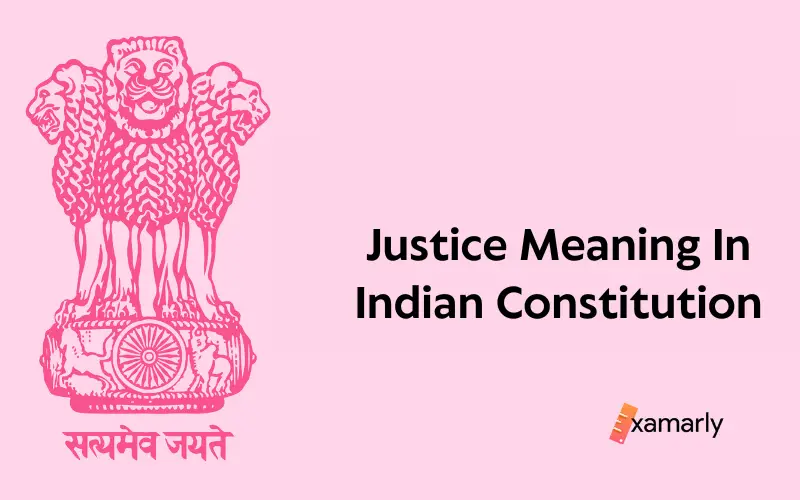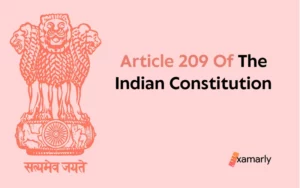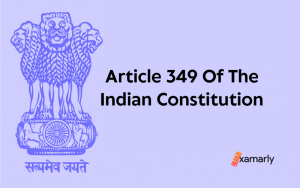Justice word originated from the French word ‘Jostice’, it stands for rightness, equity, and the enforcement of the law. Justice meaning in Indian constitution is not just a literal meaning to a given word but an idea that has existed for as long as society and civilization have. A civilized society cannot be imagined without Justice. Any nation’s foundation must include justice as one of its main tenets. Being a very mandate of every community that upholds the law, it is one of the pivotal pillars supporting any country’s development. Justice also means that a law should be applied fairly rather than arbitrarily.
- The Universal Concept Of Justice
- Constitutional Provisions relating to Natural Justice
- Constitutional Provisions Relating To Social Justice
- The Concept Of Justice In The Indian Constitution
- Distributive Justice Meaning In Indian Constitution
- Relationship Between Social, Political And Economic Justice
- Role Of Judiciary
- Conclusion
- FAQs
The Universal Concept Of Justice
Constitutional Provisions relating to Natural Justice
Article 14
Within the borders of India, this article ensures equality before the law and equal protection under the law. It requires the State to take measures to prevent prejudice across the country. It incorporates the Basic Rule of Law idea.
Article – 15(1)
Discrimination based on religion, ethnicity, caste, gender, or place of birth is forbidden. The state has a responsibility to provide for the needs of women, children, Schedule Caste & Schedule Tribe peoples, and any classes of citizens who are socially or educationally marginalized.
Article – 21
No one’s right to life and personal liberty may be taken away from them other than by legal Proceeding
Article – 22
In specific circumstances where Natural Justice is present and is within its purview, it grants exceptional rights to those who have been arrested.
Articles – 32 and 226
For violations of Legal Rights and fundamental Rights, they collectively lay out constitutional remedies. They can be used by issuing the proper Writs, Directions, and Orders.
Constitutional Provisions Relating To Social Justice
Article – 19
It states many Fundamental Rights for the citizens of the country. Seven clauses of Article 19(1) guarantee the citizens seven different kinds of freedom. when considered as a whole, furnishes a very satisfactory and rational basis for adjusting the claims of the individual rights of freedom and the claims of the public good.
Articles – 23 and 24
It contemplates the Right against Exploitation. Article 24, particularly, prohibits an employer from employing a child of lesser than 14 years of age in any factory or mine or any other Hazardous Employment.
Article – 38
It emphasizes the State to secure a social order for the promotion of the welfare of the people by effecting Social, Economic and Political Justice.
Article – 39A
It emphasizes that State shall secure the operation of the Legal System promotes Justice on a basis of equal opportunity and Free Legal Aid be provided to ensure that opportunities for securing Justice are not denied to any citizen because of economic or other disabilities.
Article – 41
It emphasizes, Right to work, the Right to education and the Right to public assistance in certain cases.
Article – 46
It emphasizes the importance of the promotion of the Educational and Economic Interests of SCs/STs and other weaker sections.
The Concept Of Justice In The Indian Constitution
- The concept of distributive justice is the foundation of the Indian Constitution. Our Constitution provides for social justice, Political justice, and economic justice based on societal context and requirements.
- In the preamble of the Indian Constitution, the idea of justice is firmly established. The Indian Constitution’s drafters made sure that justice was included because they understood the importance of establishing justice in a nation.
- The Basic principle of fairness enshrined in the preamble of the Indian constitution is also reflected in Articles 14, 15, 16, and 17. All of these articles are included in the third section of the constitution, which guarantees each citizen certain fundamental human rights.
- Article 39A of the Indian constitution contains provisions relating to “Equal Justice and Free Legal Aid.” which guarantee each individual the right to get free legal assistance from court officials. Free legal assistance is available to everyone.
- It is the responsibility of the State to ensure that the functioning of the legal system is based on justice, to promote equality of opportunity, and to offer free legal aid to ensure that no citizen is denied the chance to pursue justice because of his or her financial situation or other disabilities.
You Might Also Like – Preamble Of Indian Constitution
Distributive Justice Meaning In Indian Constitution
The concept of distributive justice is the foundation of the Indian Constitution. Distributive justice states that “the mechanism established by legislation must have meaning according to growing society standards and human fairness in actuality and practice,” not merely the appearance of attribution.
Social Justice
- Social justice refers to the availability of equal social possibilities for everyone’s personal growth, without any discrimination based on race, sex, or grounds of caste. Social justice calls for treating those who are unfairly treated equally and doing more good for people.
- In the Kesavananda Bharati case, the Supreme Court Of India ruled that social justice is a fundamental component of the Indian Constitution.
- Due to these distinctions, nobody should be denied the social circumstances needed for their progress. The practice of social equality serves as the foundation for the idea of social justice. Only in a society free from male exploitation by males can social fairness be upheld.
- The Supreme Court of India declared social justice and judicial review to be two fundamental elements of the Indian constitution in the case of S.R. Bommai v. Union of India
Economic Justice
- The Indian constitution depicts socio-economic justice as being incorporated under the Directive principles of state policy, suggesting that economic justice is in some way related to social justice itself.
- Economic justice entails removing barriers to economic opportunity, equality of status, and prosperity. It is consistently carried out under the auspices of social justice.
- Economic justice calls for economic equality for all members of society. Individuals shouldn’t be treated differently based on their economic Status. No one should be denied a chance because of their financial situation.
- Any individual should not be denied chances because of his or her financial situation. Economic justice refers to the elimination of poverty through the augmentation of national resources and assets and the equitable distribution of this prosperity to all participants in its generation.
Political Justice
- A system without political arbitrary decision-making is referred to as political justice. The way the government operates should be politically just. Any person should be treated equally with no preference based on their political standing and should not receive any special treatment. No matter what one’s political affiliation, every law should apply to the same.
- Political justice entitles all citizens to equal political rights such as the right to vote, the right to contest elections and the right to hold public office etc.
- Fundamental rights mentioned in the third chapter include in content certain basic rights which every individual enjoys being a part of a free nation, it tries to ensure that minimum standards that are required for survival with dignity and respect are not taken away.
Relationship Between Social, Political And Economic Justice
- The 3 kinds of justice are all interconnected. The other two must be there before one can be attained.
- Political and economic justice must coexist to achieve social justice. Articles 14 and 15 of the Indian Constitution’s Part III contain provisions relating to equality that uphold all three types of justice.
- A 103rd constitutional amendment was passed in 2019 as well to guarantee economic justice for everybody. This amendment’s jurisprudence was based on the application of economic justice.
Role Of Judiciary
- Today’s court serves as the guardian of fundamental rights and the protector of civil rights. It is crucial to the execution of the three different types of justice guaranteed by the Indian Constitution.
- The judiciary has been crucial in establishing justice in the nation and making the idea of justice stated in the preamble a reality. In this sense, the judiciary’s attitude has been progressive, and it has demonstrated via its judgements that justice is a necessary component of a developed and law-abiding community.
- The court has upheld the idea of social justice in decisions like Maneka Gandhi v. Union Of India (right of liberty).
Related – Concept of Justice under Indian Constitution
Conclusion
To summarise, justice enforcement acts as a spur for a nation’s political life to improve. We need better justice administration to improve democracy. Any society cannot become a constitutional society without the existence of all forms of justice; with this in mind, the writers of our constitution incorporated this idea into the preamble as well as parts III and IV of the Indian Constitution. To develop a system based on a justified approach, there is a critical requirement for cooperation across the three branches of the government.
FAQs
What Is Justice means in Indian Constitution?
Justice in Indian Constitution stands for access to social justice, economic justice, and political justice, for all the People equally.
Is Justice A Fundamental Right Of The Indian Constitution?
In Anita Khushwa v. Pushpa Sadan (decision handed down on July 19, 2016), a Constitution Bench of the Supreme Court had upheld earlier statements that “access to justice” is a fundamental right under Article 21, but also made an effort to pinpoint the many elements of access to justice. Speaking on behalf of the Bench, CJI TS Thakur stated that Article 14 and Article 21 both address access to justice.






